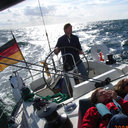Lysine-acetylsalicylic acid in acute migraine attacks.
Keywords
Abstract
Vasoconstrictive agents have been widely used in the treatment of migraine. These types of drugs have various side effects and are not suitable for many patients. Due to nausea or vomiting, nonoral treatment is often required, but only a few nonvasoconstrictive drugs exist in a parenteral form and are suitable for the treatment of acute migraine in the emergency setting. In a randomized, double-blind, crossover trial we evaluated the efficacy of 1,000 mg lysine-acetylsalicylic acid i.v. (LAS) compared to 0.5 mg ergotamine s.c. in 56 patients (112 attacks) with acute migraine. To gain further insight into the possible role of vasoconstriction, blood flow velocities (BFV) were measured in intra- and extracranial arteries using duplex sonography and transcranial Doppler sonography. Both agents were equally potent in relieving headache. Intravenous LAS resulted in a significantly faster relief and had fewer side effects. LAS had no effect on BFV. Ergotamine increased BFV in the middle cerebral artery only. No correlation was found between changes in BFV and the relief of headache. This is the first trial to compare the intravenous formulation of LAS in the treatment of migraine with another antimigraine medication and suggests that it is an effective and safe drug for the parenteral treatment of acute migraine attacks.


